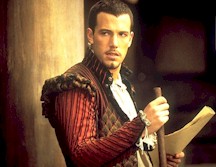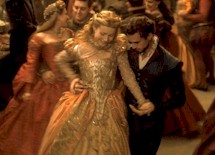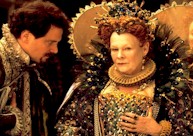 |


|
|
The Latest Film Cover Up Closeting the World's Greatest Playwright |
|
Film Criticism by Dr. George Weinberg
A woman's face with nature's own hand painted Hast thou, the master-mistress of my passion
Yet a hundred million emotional morons have failed to see that sonnet as written to a man. It is testimony to the human capacity to believe what we want to believe, or feel we need to believe, when we consider famous homosexuals who have been redefined as heterosexual.
Are we to read "him" as "her?" Really, in the ideal world it shouldn't matter whether Shakespeare was hetero, gay or bisexual. And it doesn't especially matter to me, or perhaps to you. But what has to matter to us is the desperation over the centuries to deny that this man, this genius, was erotically aroused by men and was deeply engaged in loving at least one. We know that he left his wife and three children behind in Stratford and remained working in London until only a few years before his death. We know, too, that in his will he left his wife his 'second bed." Hardly a compliment.
Witness—or rather don't witness the new film, Shakespeare in Love which portrays the bard as a clearly heterosexual Romeo in love with a Juliet who inspires him to greatness. There are the time-honored mistaken identity, false-costume twists, but to depict Shakespeare himself as a homosexual? We seem nowhere nearly up to that. We are perhaps less likely to consider it these days than we were in the Stonewall era when I coined the term homophobia. Homosexuality is talked about widely. The topic is not shocking anymore. But when it comes to portraying great people, inspirational people, who would serve as role models and the stuff of arguments that gay children might make in defending themselves against parents, we haven't come very far. When it comes to talking about big name people, we are still in the early movie days of The Cole Porter Story which took a man whom everyone in theatre knew was homosexual and made him a blatant hetero. Or later when The Agony and the Ecstasy showed Michelangelo to the world as a hetero.
Society may countenance homosexuals, but it seems as zealous as ever not to let our heroes or heroines fall, by revealing them as gay men or lesbians. While visiting Rome I heard a tour guide tell his group that Michelangelo had a love affair with a woman, one which he never had—or perhaps even dreamt of having. In the only two biographies of Michelangelo written during his time, one by Vasari in Lives of the Painters and the other, more authoritative, by Condivi, it is clear that Michelangelo was not a lover of women. His beloved younger male friend, the handsome Tomasso Di Cavalieri, was always invited with him to peoples' homes. To Tomasso went Michelangelo's love and responsibility for his work at the end. There was—in the early 1970s—a more honest film about homosexuality and the great Tchaikovsky, who hated himself because of his orientation and would write in his diary that he'd "had a little Z today" because he couldn't even write the word. Tchaikovsky finally committed suicide when the revelation of his homosexuality was about to disgrace him, thereby depriving us of who-knows-how much music that would have lifted our lives, Clearly the homophobia in his case was internalized and not simply all around him; his Russian society had taught him to see himself as a misshapen, freakish thing. Shakespeare's case is especially interesting to me because he has been so influential to me, as he has been in tens or hundreds of millions of lives. His Sonnets, most of which were obviously written to a man, went through a small private printing at first. As his reputation grew, scholars went over them with their silly interpretations. At first, it was deduced that one of those sonnets was written to a man and the rest to a woman. Slowing the accepted wisdom changed. A half dozen were written to a man, then more, over the centuries the number increased until now it is believed that at least a hundred and twenty of the hundred and fifty two sonnets are to a man. Still, they concluded, it wasn't a male lover, but someone the bard admired Platonically, a man who inspired him but didn't arouse him erotically. How could the scholars know Shakespeare's erotic inclinations since most of these critics probably don't know their own? It's as if Shakespeare has been coming out for centuries, but is still only nearing the closet door. One can easily understand Shakespeare's own reticence to declare himself in Elizabethan times, when intrigues and political spies were in every corner. His chief rival playwright, Christopher Marlowe, a declared homosexual, was murdered at age twenty-nine, for reasons that aren't utterly clear, even yet. What matters to all of us, I think, was not Shakespeare's secrecy but the delusion and frenzied crushing of homosexual references in Shakespeare. Scholars are still expurgating the plays, so that marvelously creative people still to be born and to discover that they are gay, won't have Shakespeare as an exemplar who felt like they did. They are by their censorship still telling young gay people with dreams and aspirations that their being homosexual will disqualify them from love and happiness. It's interesting to look at several of the homosexual moments in Shakespeare, which scholars would pinch out of his works like fleas. In King Lear, for instance, Kent propositions a foppish character named Oswald, asking to commit fellatio on him. Kent's way of saying it is: "If I had thee in Lipsbury pinfold, I would make thee care for me." Unable to acknowledge that Lipsbury pinfold (the town of lips) refers to fellatio, scholars have for centuries scoured the Elizabethan landscape for a place called Lipsbury. They have searched in vain. And even if they had found a Lipsbury, why would you care for someone who put you in that town? Moments later, Kent calls Oswald a cock-sucker by referring to him as "an eater of broken meats." Yet this obvious explanation of Lipsbury still isn't noted in glossaries. A particular reference that interests me is a comment made by a eunuch in Antony and Cleopatra. When Cleopatra asks the eunuch whether he has "affections," he replies that he does, that he likes to think what "Venus did with Mars." Not what Mars did with Venus, mind you: what Venus did with Mars! This reference, to my knowledge, has never been noted anywhere as homosexual, but it may tell us something interesting. Shakespeare wrote a long poem that some daring thinkers have suspected might have been a love poem, to the man he was staying with during a time when the theatres were closed because of a plague, a period when he presumably wrote most or all of the sonnets. He inscribes it "To the right honorable Henrie Wriothesley." Wriothesley was Earl of Southhampton, a wealthy and beautiful man about ten years younger than Shakespeare. The poem, Venus and Adonis, is from the point of view of Venus, who seduces the young, coy Adonis, only to have him die in her arms. That's this was a device to depict love for a younger man is admittedly speculation on my part, though not wildly farfetched speculation—nothing like the speculation needed to escape the Lipsbury reference.
One could go on and on, there isn't much point adducing proof. It only matters because scholars are so fanatical in their censoring commentary of people who might inspire gay men and lesbians to believe in themselves. A sad sonnet, which I would like to end with, is the gorgeous sonnet 71, which begins, "no longer mourn for me when I am dead." And why should his lover not mourn him? A man's wife can mourn his death. A man can mourn his wife's death or the death of a child. But one does not openly mourn the death of a like-sexed lover—or at least one did not. Shakespeare explains why is lover should not mourn him. Lest the wise world should look into your moan, And mock you with me after I am gone. They mocked anyone who wept at the death of a same-sexed lover. I guess many still do. Especially our scholarly fathers who would homogenize greatness as a way of instructing us all how to live. Dr. George Weinberg Coined the term homophobia in 1971. With Diane Rowe, he co-authored a book on Shakespeare titled Will Power. Heterosexually-inclined, Dr. Weinberg is the author of Society and the Healthy Homosexual, the groundbreaking 1971 critique of the then anti-homosexual prejudices of his professional peers. He is also the author of many other works including The Taboo Scarf and Nearer to the Heart's Desire. |

© 1997-98 BEI
 Joseph Fiennes is the Bard
Joseph Fiennes is the Bard  Ben Afleck plays a comic actor of Shakespeare's ... but not a lover
Ben Afleck plays a comic actor of Shakespeare's ... but not a lover  The very non-gay Shakespeare with Viola (Gwyenth Paltrow)
The very non-gay Shakespeare with Viola (Gwyenth Paltrow)  Judi Dench is the queen ... not Shakespeare.
Judi Dench is the queen ... not Shakespeare.